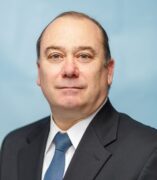
Carlos O Stocco, PhD
Professor
Department of Physiology and Biophysics
Contact
Building & Room:
COMRB 2133
Office Phone:
Fax:
Lab
Building & Room:
COMRB 2120
Email:
Related Sites:
About Heading link
Dr. Stocco is a reproductive physiologist with a distinguished record of achievements and extensive expertise in ovarian function research. Over the last decades, he has focused on unraveling the intricacies that govern ovarian function, exploring deep into hormone signaling and the activation of genomic pathways critical for female fertility. Dr. Stocco has significantly contributed to understanding ovarian physiology in mammals. Central to his research’s success is the unwavering support of prestigious NIH grants, which have provided the necessary resources and solidified the foundation for developing this proposal. His laboratory’s diverse range of techniques and methodologies empowers us to study ovarian function with precision and insight, from conducting in vivo experiments using conditional knockout mice to employing sophisticated molecular tools like highly efficient silencing and expression systems in primary cultures of human and rodent ovarian cells. Building upon the achievements of previous and ongoing studies, they currently seek to study the interplay between the SIKs and gonadotropins in regulating theca cell function. By pursuing this groundbreaking research, they seek to unravel the biochemical and cellular processes orchestrated by SIKs that critically contribute to maintaining normal ovarian function, follicle survival, and female fertility. These studies’ outcomes can potentially revolutionize the field, illuminating novel avenues for therapeutic interventions and advancing our understanding of reproductive health.
Research Heading link
Dr. Stocco has trained undergraduate and graduate students, fellows, postdocs, and future physicians since he started researching. He considers teaching one of the most significant and “translational” contributions a basic researcher can provide in an academic institution, and, as his record demonstrates, teaching is an essential goal in his career as a scientist. Dr. Stocco believes that teaching should involve the active participation of the students in the class to promote purposeful and enduring learning. As a researcher, he teaches in a way that reassembles the process, leading to the discovery of the concept being taught in a way that engages the student. He also firmly believes that teachers must tell a story in class. This teaching method also allows me to include active learning activities, such as diagrams with questions, which help me assess student’s knowledge and understanding of the material. He encourage independent thinking and reasoning to improve problem-solving skills by using questions and clinical cases. Thus, students do not just memorize but apply concepts to resolve problems or understand diseases. Throughout the years, Dr. Stocco has received compliments from many students regarding the clarity of his slides and lectures, which is evidenced by consistently high student evaluations. For the formation of PhD and Master students, his primary approach is to guide the students to develop their critical thinking and be extremely rigorous when they design and conduct experiments. Dr. Stocco is a “hands-on” advisor who spends a significant amount of time in the lab; therefore, he is always available to discuss the progress of the project and troubleshoot experimental problems. However, he considers independent thinking and self-drive to be the most critical characteristics of a PhD student. Thus, he encourages students to explore new ideas that could advance their studies. This also allows them to make unique contributions, understand a broad range of concepts, and ultimately own the project.
Selected Publications
Hayes ET, Hassan M, Lakomy O, Filzen R, Armouti M, Foretz M, Tsumaki N, Takemori H, Stocco C. (2024) SIK2 and SIK3 Differentially Regulate Mouse Granulosa Cell Response to Exogenous Gonadotropins In Vivo. Endocrinology;165(10). PMID: 39158086,
Armouti M, Winston N, Hatano O, Hobeika E, Hirshfeld-Cytron J, Liebermann J, Takemori H, Stocco C (2020) Salt Inducible Kinases Are Critical Determinants of Female Fertility. Endocrinology 161: 1–13. This manuscript was highlighted on the journal’s website.
Baumgarten, SC, Armouti M, Ko C, and Stocco C. (2017) – Conditional Deletion of Insulin Growth Factor Receptor 1 in Granulosa Cells Causes Infertility. Endocrinology 158: 2309–2318. A commentary about this publication was written to emphasize the novelty and significance of these findings (see “Female Fertility: It takes two to tango” (Endocrinology 158:2074-2076).
Stocco C, Baumgarten SC, Armouti M, Fierro MA, Winston N, Scoccia B, and Zamah, AM (2017). Genome-wide interactions between follicle-stimulating hormone and insulin-like growth factors in the regulation of human granulosa cell differentiation. Human Reproduction. 32:905-914.
Hobeika E, Armouti M, Fierro MA, Winston NJ, Zamah MA, Scoccia B, Stocco C (2020) Regulation of Insulin-Like Growth Factor 2 by Oocyte-Secreted Factors in Primary Human Granulosa Cells. Journal of Clinical Endocrinology and Metabolism 105:327-335.